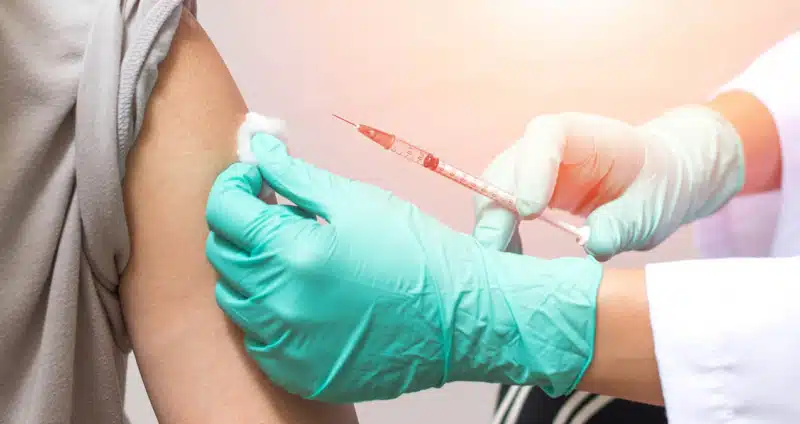50% of patients will have improvement of symptoms lasting 10-20 years.
*After three years of treatment. Results vary by patient. This number rises to 80% if treated for 5 years.

What is immunotherapy for allergies?
Allergy immunotherapy makes you less sensitive to the things that trigger allergies and allergic asthma. This treatment typically takes 3-5 years after your allergy specialist identifies the allergens, determines the proper doses, and how it should be administered.
How does allergy immunotherapy work?
Immunotherapy uses a concentration of proteins from the substance that is triggering your allergies; pollen, dander, dust mites, insects, mold, etc. This allergen extract is administered through an injection or with allergy drops or pills.
Can you do immunotherapy at home?
Subcutaneous immunotherapy (allergy shots) should not be done at home. This is the most concentrated form of allergen delivery and can lead to severe reactions. While this is rare, it can happen. Oral immunotherapy (drops or a tablet under the tongue) is safe to be administered at home, if your location offers the service.
A board-certified allergist performing immunotherapy ensures:
- Thorough communication with patient about preparation, results and treatment plan.
- Proper preparation of allergenic products.
- Antiseptic hand cleaning and disinfection.
- Exact measuring of allergen extracts.
- Screening appropriateness of candidates.
- Attentiveness to and management of possible reactions.
How immunotherapy works
Build-up stage
This stage takes anywhere from 4 months to 1 year generally and involves getting the patient safely to the effective dose. Once reached, the process moves into the maintenance phase.
Maintenance stage
The patient takes the effective dose on an ongoing basis. This stage typically lasts for 3-5 years to have long-lasting relief. For oral options, treatment is daily during this time. Shots can eventually be spaced to monthly injections.
Relief from symptoms
After an initial improvement in symptoms, you may not notice additional improvement for several months. If successful, you should see long-term benefits and a reduction in symptoms.

What is the success rate of immunotherapy for allergies?
The effects of immunotherapy can last even after the treatment stops. Immunotherapy for allergies can be long-lasting, and patients can even experience life-long symptom reduction. It helps tremendously in the management of allergic rhinitis, allergic asthma and insect sting allergies.
Which allergies can immunotherapy treat?
Some research has shown that providing immunotherapy for allergic rhinitis can prevent the development of asthma in children. Ongoing research is exploring immunotherapy as a treatment option for food allergies.
Which specific allergens can immunotherapy treat?
Here are some of the specific allergens that immunotherapy can be used to treat:
- Pollen: Immunotherapy can treat allergies to pollen from trees, grasses, and weeds. This includes allergens like ragweed, oak, cedar, birch, ryegrass, and many others.
- Dust Mites: Dust mite allergy is another common problem that can be treated with immunotherapy. Dust mites are tiny organisms that live in house dust.
- Mold: Certain types of mold spores can cause allergic reactions. Immunotherapy can help reduce sensitivity to these allergens.
- Pet Allergens: Immunotherapy can also be effective in treating allergies to certain pets. This includes cats and dogs, which are the most common, but it can also include other animals.
- Insects: Insect sting allergies, such as those to bees, wasps, hornets, yellow jackets, and fire ants, can be treated with immunotherapy.
- Cockroaches: Allergies to cockroaches and their droppings can also be addressed with immunotherapy.
It’s important to note that how effective immunotherapy can be varies from person to person, and not everyone will see a complete elimination of symptoms. Some people may see a significant reduction in allergy symptoms, while others may see only a minor effect.
In addition, not all allergens can be treated with immunotherapy. For example, latex allergies and certain types of drug allergies are not typically treated with immunotherapy. Always consult with an allergist or immunologist to understand the best course of treatment for any allergies.
Types of immunotherapies for allergies
Your allergy specialist will discuss your options for immunotherapy treatment and together you will select the treatment that works best for you. There are three types of immunotherapy treatments: allergy shots, sublingual administration and oral administration.

Allergy shots
Subcutaneous immunotherapy (allergy shots) are used to desensitize your body to allergens, similar to the way a vaccine works.
Allergy shots are used most frequently to treat allergic rhinitis, allergic asthma and insect sting allergies. Allergy shots are administered at the allergy clinic.
The FDA’s Center for Biologics Evaluation and Research (CBER) regulates substances used in immunotherapy. They have approved the injectable allergen extracts used in allergy shots.

Sublingual immunotherapy
NOTE: This form of immunotherapy is not available at all of our locations.
Sublingual immunotherapy uses tablets or allergy drops which are placed under the tongue.
The FDA has approved the immunotherapy tablets, however, immunotherapy drops are not approved by the FDA and may not be covered by insurance.
The tablets or drops can be taken at home as prescribed by your specialist. Again, that is if your particular clinic offers this service.

Oral immunotherapy
Food allergies can be treated with food allergy immunotherapy (OIT). Under the supervision of your allergy specialist, you eat a small mount of the food to which your are allergic. This amount is slowly increased over time leading to tolerance of the food.
The oral immunotherapy Palforzia has been approved by the FDA for treating peanut allergies.
Allergy immunotherapy side effects
Immunotherapy can cause a variety of side effects, more commonly in the short term.
Most are mild and go away on their own soon after the injection. According to the American College of Allergy, Asthma, and Immunology (ACAAI), some common short-term side effects include:
Redness, swelling, or irritation at the injection site
One of the most common side effects and usually clears within a few hours.
Sneezing, nasal congestion, or hives
These are mild allergic reactions that are possible shortly after the shot.
Asthma symptoms
For those with asthma, allergy shots might cause a temporary increase in asthma symptoms.
In rare cases, allergy shots can cause a severe allergic reaction (anaphylaxis). Symptoms can include:
- Difficulty breathing
- Throat or tongue swelling
- Dizziness or fainting
- Rapid or irregular heartbeat
This is a medical emergency and requires immediate attention. For this reason, allergy shots are given in a medical setting under the supervision of a healthcare provider so that any severe reactions can be treated immediately.
Shot patients are typically asked to remain at the clinic for 30 minutes after their injection to ensure they do not have a severe reaction.
The risk of severe reactions is highest during the initial phase of treatment when the dosage is being increased. This risk decreases once the maintenance phase is reached.
If you have any concerns about the side effects of allergy shots, it’s best to discuss them with your healthcare provider.

Which clinics administer immunotherapy for allergies?
Immunotherapy is a widely accessible treatment option for allergies, and patients can find it readily available at all AllerVie Health locations nationwide.
AllerVie Health clinics offer comprehensive immunotherapy services, ensuring that patients across the country have access to this effective treatment method.
With a network of clinics, AllerVie Health aims to provide convenient and reliable immunotherapy services to individuals seeking relief from their allergies.
View Locations
The cost of allergy immunotherapy
The cost of immunotherapy can vary depending on the state and the patient’s insurance provider.
The cost of immunotherapy may include several factors such as the cost of allergen extracts, office visits, and administration fees. Additionally, the coverage provided by different insurance plans can also greatly influence the out-of-pocket expenses for patients.
To provide an estimate of the cost, a patient should expect to pay for a series of allergy shots, which typically involves a long-term treatment plan spanning several years. The total cost can range from a few hundred to a few thousand dollars, depending on various factors.
To find out the specific cost of immunotherapy, patients are advised to contact their insurance provider directly.
By calling the member services number on the insurance card, patients can ask about their coverage for immunotherapy and ask for details on copayments, deductibles, and any other relevant cost information.
It’s important for patients to verify their insurance coverage and understand the potential financial responsibilities associated with the treatment before continuing with immunotherapy.
Please note: The information above is a general guideline, and specific costs may vary depending on individual circumstances, insurance plans, and regional differences. It is always recommended for patients to consult with their healthcare provider and insurance company for personalized cost estimates and coverage details.



